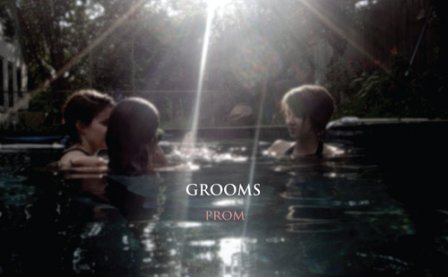On “Fag Feels Good,” one of the many gems that Grooms drop on their debut album Rejoicer, Travis Johnson slackishly sings about a place “where guitars sound like guitars.” After having consumed way too many synth-banging, dance-party indie releases this year made by artists who never stopped to consider the critical message on track seven of EPMD’s Business Never Personal, hearing about such a place is like hearing about heaven. As new modifications are made to create more sub-sub-genres of indie music with the hope of avoiding mainstream absorption — a tactic that might result in ghettoization in a few years as listeners further embrace rootlessness and continue to abandon styles on a whim — those who remember the glorious days of indie rock’s beginnings might find refuge and joy in Rejoicer. By tapping into indie rock’s foundations — bands like Sonic Youth and Pavement — Grooms have created a place where guitars sound like guitars. This might have been a trite statement 10 years ago, but uttered in a year when the return to 80s pop culture has been celebrated in some circles, it might make more sense to return to the sounds that combated 80s pop culture.
Johnson, Emily Ambruso, and drummer Kevin Murphy released a few EPs earlier in the decade as The Muggabears. Grooms — Johnson and Ambruso, now with Jim Sykes holding the sticks — have supplemented the sonic ethos of The Muggabears with a more focused song delivery. The tracks on Rejoicer are motivated by dissonant guitar pop-hooks reminiscent of Sonic Youth’s Sister era, and Johnson’s laid-back but sharp lyrics merge the styles of Mascis and Malkmus, respectively. The multiple riffs dance around each other on the breakdown of “Dreamsucker,” intermittently disrupted by a thick, gain-heavy counterpart. Despite the guitar-centric hooks that ground the songs, Grooms keep it diverse and interesting. The rhythmic builds and guitar textures on “Thumbs” eventually lead to what might be a reference to The Beach Boys’ “In My Room,” as Johnson drops the name and Ambruso’s vocal harmonies smoothly float above it.
The transitional components on “At The Pool” show Grooms disrupting the stale trajectory of typical indie song structures, combining multiple internal movements that lead to an emotive and sonic catharsis. The barrage of guitar noises and squalls is replaced by a simple guitar phrase and a smooth beat-outro. “Fag Feels Good” is reminiscent of the sounds on Broken Social Scene’s You Forgot It In People, where, despite the multitude of guitar tracks whirring around, there is enough space between the notes that they don’t blur into oblivion. Ambruso’s vocal harmonizing provides an ethereal but revitalizing mood that lingers throughout the album, especially on “Ghost Cat,” where she finds a space just above the feedback wall that enables her to contrast perfectly with its harshness. Johnson’s signing on “CJ” taps into Thurston Moore’s sassiness, but when he connects to Ambruso’s harmonizing seconds later, he shows that he can do more than deliver sharp jabs. On “She-Bears,” the ghosting vocals that soar above the dissonant phrases and cymbal shimmers gets momentarily Pocahaunted, but the rhythm structure doesn’t allow it to drag and go nowhere. Rather, it delivers it to safety, nestled forever inside a buzz of guitar feedback and hum.
Some might protest that Grooms’ aesthetic is inauthentic and backward-looking, namely that they are simply re-exploring sound-worlds that were conquered and exacerbated over a decade ago. I strongly disagree with this claim, namely because Grooms have made a significant contribution to these historical modes by merging them with rich vocal harmonies while simultaneously maintaining their experimental/noise roots. Furthermore, all artists must look back at the past and select the historical components that they want to bring into the future. What matters, then, is how one makes that choice. Much buzz and slurring has been going on recently over David Keenan’s fabrication of hypnagogic pop in a recent issue of the expensive British music magazine The Wire. Assuming that there is such a thing as this movement, these artists look back at history and choose to bring fragments of 80s pop culture into the future. Grooms, however, have chosen to bring into the future the foundational indie sounds that were arguably developed as a direct protest against the nihilism, hyper-individualism, and hyper-consumerism of 80s pop culture. It was the latter that early indie bands like Black Flag and Sonic Youth detested, for they knew that its apparent harmlessness was merely a cloak for political conservatism. These are the giants' shoulders that Grooms have chosen to stand upon, and with Rejoicer they have done so excellently.
1. Dreamsucker
2. Thumbs
3. At The Pool
4. Fag Feels Good
5. Acid King Of Hell (Guitar Feelings)
6. Ghost Cat
7. CJ
8. She-Bears
9. Kier
10. The Nights Were Walls (We Climbed Them All)
More about: Grooms



